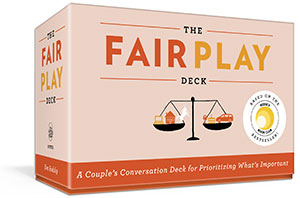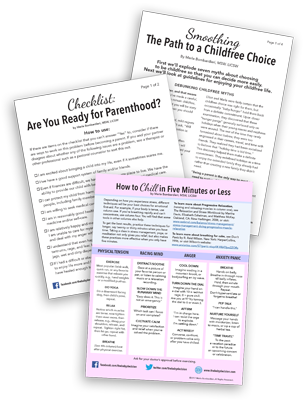
By Merle Bombardieri, MSW, LICSW
In the Decision Café, my private Facebook group for parenthood-decision-making (co-hosted with Katie Wilson), one woman posted, “I would definitely choose to parent if I could just be a dad.” Many other Café members echoed this sentiment. What they mean is that they can imagine parenting itself as pleasurable, but only if they could take a father’s role: tend to your child, but keep your job, your identity, your weekend pursuits. Be willing to “help” with childcare and housework, but not do most of it. Everyone knows that “most of it” is mother’s work.
The mother role is strikingly different, and none of the Decision Café members want it. A mother, even if she works full time, will typically do the lion’s share of housework and childcare. But that’s not the worst of it. No matter how smart and accomplished she is, no matter how much she hates “mommy culture,” how much she wants to keep her identity and job and just add motherhood into the mix the way fathers do, the cards are stacked against her. Society, family, even some friends expect that once that baby pops out, motherhood will be her primary life, and not just a part of her life. She’s supposed to like this change. If she doesn’t, she’s unfeminine, not the right kind of mother. This assumption is sexist, insulting, bullying, energy sapping, and soul crushing. This assumption is destructive to all three family members. The potential loving energy in a family of three, the potentially peaceful nursing, cuddling, exquisite bonding of mother-baby intimacy gets crushed under the avalanche of anger, pressures and losses.
Unfortunately, this post contains no magic. But it does offer a framework for understanding the problem and guidelines for couple conversations about it.
If you are already strongly leaning toward childfree anyway, the fairness issue may simply reinforce your resolve to be childfree. However, if you’re just beginning to tilt towards childfree, totally on the fence, or leaning toward parenthood, these guidelines for talking about fairness in parenting, before you decide to give birth or adopt, can guide your decision. If you do choose parenthood, despite anxieties about the division of labor, you’ll be ready with tools for working it out.
You have an advantage over couples who assumed, “We’ll just work it out as we go.” But right now, you’re a lot more clear-eyed and in control than you will be when the baby arrives. So let’s get started.
The Framework
The problem isn’t just about you and your partner. In our society, we tend to think that we as individuals and couples are supposed to solve everything on our own.
But you didn’t invent sexism. You’re not responsible for the suffering of previous generations, where women were overburdened and resentful, and men didn’t experience the pleasures and intimacies of playing, cuddling, and hanging out with their kids. Instead, they worked long hours, including travel. And when they were home, they didn’t know what to do with their kids other than tossing a few balls. How could they know since their fathers, with no role modeling from their fathers hadn’t known what to do with them. Today’s fathers get to experience the pleasures of parenting as well as the burden of doing more of the work. This concept helps men look forward to the joys of parenting and to be willing to tackle the equity question with their partners.
You are not responsible for the fact that, unlike other industrialized nations, this country provides little or no parental leave (especially desperately needed PAID parental leave, and only rarely childcare or early childhood education). Inflexible work hours and penalization for time off makes things worse. A few illustrations before we roll up our sleeves to brainstorm solutions.
An American woman who returned home after working in France wrote an op-ed about her dismay when she discovered that her life as a working mother had gone from easy to impossible. Even though her company was American, she worked for them in France. That meant that the French government required that her company provide their workers the same paid time off, flextime, and subsidized childcare that French families enjoyed. The author assumed that working while raising a young child was easy, because it actually had been until she was transferred home. Then all the supports she and her husband had taken for granted completely disappeared!
Remember my “Swedish Family Hotel” exercise in The Baby Decision? I described not only the services I mentioned above but also a planned community. Families lived in simple, private living spaces, but spent time in communal buildings as well, for some meals and community events. The school and park were right in the complex so kids could walk (or run) there on their own. In this segment of the book, I asked readers if they would choose parenting if such a “family hotel” arrangement was available. I used this exercise to help people see whether their childfree leaning was a true lack of desire for parenting or a response to the dearth of crucial supports for parents.
When The Baby Decision was recently translated into German, I had to delete the chapter on how to negotiate with corporations and government organizations to create support systems. Why? Because Germany, Switzerland, and Austria already had these supports. Researchers and mothers themselves in these countries report there are still inequalities at home and at work, but even so, life is easier for parents in these countries.
Guidelines for Planning for Equity in Parenting
Now that you have some perspective, let’s talking about planning. Here are some suggestions.
- Create a foundation for talking. Remember that you are loving partners, even if some of these conversations might make you feel like enemies. This is not about who’s right and who’s wrong, who will win, who will lose. Your goal is to brainstorm ways to achieve fairness, so you can think outside the box about what would be best for your unique family and personality.
- Plan discussion at times that are comfortable for both of you.. Be compassionate toward yourself and your partner. Acknowledge how unfair and unpleasant this issue is, and how hard it is to decide about parenthood.
- Nothing is written in stone. To have freedom to brainstorm, no one should assume that any idea is a commitment or a promise. Unless you’ve already agreed that you will become parents, acknowledge that working on the equity question doesn’t constitute an implicit agreement that you will have a child. Start with the assumption that if you do have a child, you have only one. Considering the possibility of two children may feel overwhelming, one child less so. You can always decide later to have a second child. But for now, keep it simple and less scary.
- Find role models. How do you work on this problem when you don’t have a real-life child or an actual schedule to practice with? Look for people you know, or through networking, find families in which the mother does only half the work and has held onto her pre-baby identity. Ask these couples if they might be willing to tell you how they worked things out. What solutions have they discovered? What problems did they encounter on the way to working things out? What problems remain? If they know you, what advice might they offer for working out your own arrangements? Also ask if they had help from family, friends, and community. Did they make adjustments based on the child’s changing needs, on whose work was more demanding at a given time? Do you have people in mind that you aren’t that close to, or whom you’ve learned about through networking but haven’t even met? Give potential role models space to decide whether to talk to you. If you think you might put them on the spot, don’t call them or bring up your request in person. You can e-mail them saying that you would like to ask them a few questions about how they handle things. Say you’ll understand if they would rather not talk about it. Be willing to talk after the child or children are in bed, or otherwise at their convenience. Offer to talk for 30 minutes or less so you won’t take up too much of their time. Be willing to talk to them anonymously if a friend sets up a phone call for you. Find role models online. On social media, Reddit’s discussion thread reddit.com/u/fencesitter has lively , heated conversations about this topic. Although this group’s main goal is to help non-parents decide whether to procreate, readers are lucky that people who have already become parents (or have chosen to be childfree) stay on to mentor those who are still undecided. They tell detailed stories of arguments, negotiations, and arrangements. They have worked out a variety of arrangements, including stay-at-home dads. Some of their solutions may resonate with you.
- Read three books and play one card game. You’ll find lots of company and ideas in the three books listed at the end of this article. One of the books, Fair Play suggests making a set of cards representing not only childcare and household tasks but also relaxation time, time out with friends while your partner cares for the child. Although you can make your own cards, buying the author’s ready-made Fair Play deck is easier. (See the bibliography).
- See a therapist, coach, or mediator to create a tentative contract for task sharing. Don’t use a professional that either of you has been seeing individually, because neutrality and trust are essential. Before going to your first appointment, do your homework. Get input from any trusted family, friends, advisors, current coaches, or therapists. Next try to write a tentative contract on your own. You will need fewer sessions if you bring this homework with you. During your consultation, you’ll not only hammer out a preliminary contract but also learn how to negotiate lovingly and respectfully. If you do go ahead with parenthood, you’ll use these skills to revise your contract as needed to accommodate changing schedules and your child’s evolving needs. Consider scheduling a tune-up appointment with your consultant once or twice a year if you’re having trouble with the contract. Imagine how great it will feel to enjoy parenting as a result of working this out!
Summary
The work we’ve been talking about is tough but worth it. Even if you decide to be childfree, the creativity, love, and humor you brought to this project will help you enjoy your childfree life.
A little food for thought.
Although, alas, you can’t know in advance, the joys of parenthood might be great enough to justify having to cope with the equity problem.
I believe if you asked most happy mothers of older or grown children if they wish they hadn’t had their child in order to prevent equity problems, most would say something like, “There were times when this problem made me/us crazy, but these children have brought immeasurable meaning and pleasure. They were worth having despite some unfairness, exhaustion, and relationship tension.
Please don’t misinterpret this. I’m not saying grin and bear it. I’m saying fight like hell for justice. Confront your partner and get professional help if the partner is not doing his/her/their fair share. But I am saying that avoiding any equity fights may not be worth giving up the pleasures of parenthood. I’m not talking here to people on the fence. I’m talking to people who are 60/40 or 70/30 leaning toward parenthood whose major objection to parenthood is their desire for 100% fairness.
Making it Fair Reading List
SELECTED BY MERLE BOMBARDIERI, MSW, LICSW
Dunn, Jancee. How Not to Hate Your Husband After Kids. New York: Little, Brown, 2017.
Emma (no last name, author goes by “Emma).” The Mental Load. New York: Seven Stories Press, 2017, “You Should Have Asked,” pp.3-21.
Lockman, Darcy. All the Rage. Mothers, Fathers and the Myth of Equal Partnership. New York: Harper, 2019.
Rodsky, Eve. Fair Play: A Game-Changing Solution for When You Have Too Much to Do. New York: Putnam, 2019
The Fair Play Deck: A Couple’s Conversation Deck for Prioritizing What’s Important. New York: Clarkson Potter, 2020. This a pack of cards for choosing and negotiating, not a book.



What’s The Current Job Market For Most Famous Pornstars Professionals Like?
most famous Pornstars
9 Mistakes In Juegos De Azar España That Make You Look
Dumb Juegos Online
Are You Sick Of Best Robot Hoover? 10 Sources Of Inspiration That’ll Bring Back
Your Passion robot vacuum and mop (H49ar4kn3dpfl0z22n74bghp5kwv1bptct6dzzb.com)
The People Nearest To Luton Auto Locksmith Share Some Big Secrets nearest
Car Locksmith Near Luton Tools To Ease Your Daily Life Car Locksmith Near Luton Trick Every Person Should
Be Able To Best luton car locksmith
5 Killer Quora Answers To Car Locksmith In Luton Car locksmith in luton
The 10 Most Scariest Things About Car Locksmiths Luton Car Locksmiths luton
What Collection Of Addresses And Links Experts Want You To Be Able To
링크모음 링크 주소
You’ll Never Be Able To Figure Out This Auto Locksmiths
Near Luton’s Benefits near
A Productive Rant About Luton Auto Locksmith Auto Locksmith In Luton
You’ll Be Unable To Guess Auto Locksmiths Luton’s Benefits auto Locksmiths luton
14 Smart Ways To Spend Your Leftover Address Collection Latest Address Budget
즈소모음
Howdy just wanted to give you a brief heads up and let you know a few of the images aren’t loading properly. I’m not sure why but I think its a linking issue. I’ve tried it in two different web browsers and both show the same results.
my web site http://194.67.86.160:3100/casimirakenney